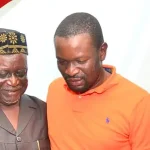When Kenyans celebrate Madaraka Day and Jamhuri Day, most remember the towering names — Jomo Kenyatta, Dedan Kimathi, Tom Mboya, and JM Kariuki. But hidden behind those iconic figures are countless families who endured unspeakable pain so that Kenya could be free.
These are the forgotten heroes — mothers who waited for sons who never came back, children who grew up in poverty after their fathers were jailed or executed, and wives who carried on their husbands’ legacies with quiet strength.
Sacrifice in Silence
During the fight against colonial rule, thousands of Kenyans joined the Mau Mau movement, a resistance born in the forests of Mount Kenya and the Aberdares. While men fought with homemade weapons, women played equally vital roles — smuggling food, hiding weapons, and nursing the wounded.
One of them was Wambui Otieno, a fearless activist who defied both colonial and traditional boundaries to fight for freedom. Another was Field Marshal Muthoni wa Kirima, the only surviving female Mau Mau commander, who spent years in the forest.
Their courage often came at great personal cost — imprisonment, torture, and lifelong stigma. Yet, their sacrifices built the foundation of the Kenya we know today.
The Families Behind the Names
The story of JM Kariuki’s family is just one example of the enduring pain that followed independence heroes. After his brutal assassination in 1975, his widow carried the emotional and social burden of raising a family while preserving his legacy.
In Nyeri, the family of Dedan Kimathi continues to demand justice and recognition. His widow, Mukami Kimathi, fought for decades to ensure her husband’s remains were exhumed and buried with dignity — a struggle that symbolized Kenya’s unfinished reconciliation with its past.
These families remind us that the cost of freedom was not just political — it was deeply personal.
Post-Independence Neglect
While Kenya’s flag waves proudly each year, many of the real heroes live in poverty. Numerous descendants of freedom fighters still occupy small parcels of land or depend on well-wishers to survive.
“My father fought for independence, but we live like strangers in the country he helped free,” says Samuel Kimathi, grandson of a Mau Mau fighter in Nyandarua.
Historians argue that Kenya’s independence story has been sanitized, glorifying a few leaders while ignoring the everyday people who carried the true weight of the struggle.
Keeping the Flame Alive
Recent years have seen renewed efforts to honor forgotten heroes. The National Heroes Council and local historians have been working to document stories of lesser-known fighters and their families.
Schools and universities are incorporating oral histories to ensure the next generation understands that independence was not achieved overnight — it was built through pain, loss, and unwavering hope.
Civil-society groups and filmmakers are also producing documentaries and digital archives featuring interviews with surviving freedom-fighter families, ensuring their names are never lost to time.
Lessons for Today
Kenya’s political landscape has changed, but the struggle for justice, equality, and dignity continues — in different forms. The dreams of the independence generation mirror today’s calls for fairness, opportunity, and unity.
JM Kariuki’s warning about inequality — “Kenya is a country of 10 millionaires and 10 million beggars” — remains hauntingly relevant. The country’s youth now carry the torch, fighting economic hardship and corruption through activism, innovation, and education.
Remembering the past isn’t nostalgia — it’s accountability. It reminds leaders that freedom was earned with blood and sweat, and that true independence means service, not self-enrichment.
Conclusion: We Remember Their Names
As the sun rises over Mount Kenya, whispers of the past still echo — in the forests where the Mau Mau hid, in the fields where women carried supplies, and in the graves of those never found.
The freedom we enjoy was not free. It was purchased by generations of silent heroes — men and women whose names may never appear in textbooks but whose courage runs through Kenya’s veins.
Let their stories be told. Let their families be honored.
Because remembering them is not just about history — it is about ensuring the promise of Kenya’s future.










